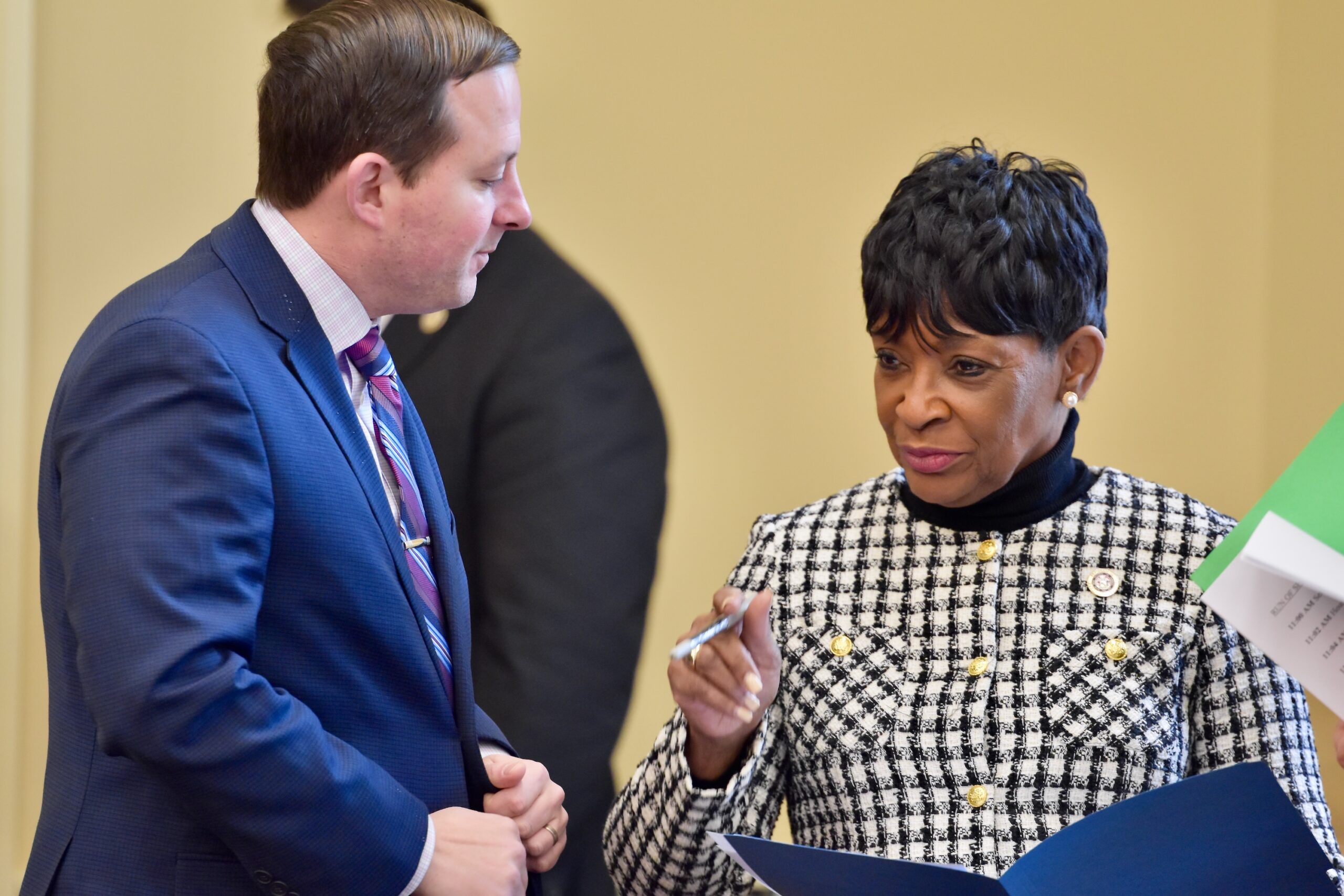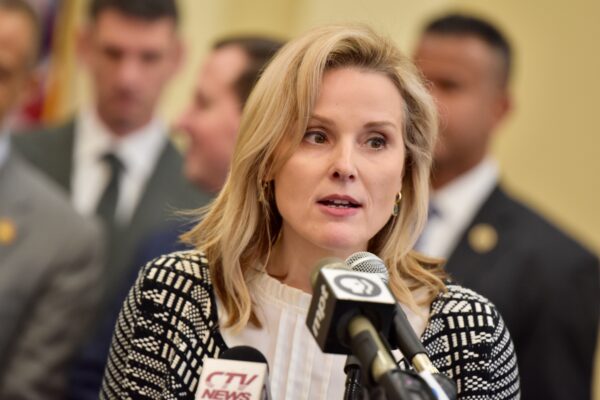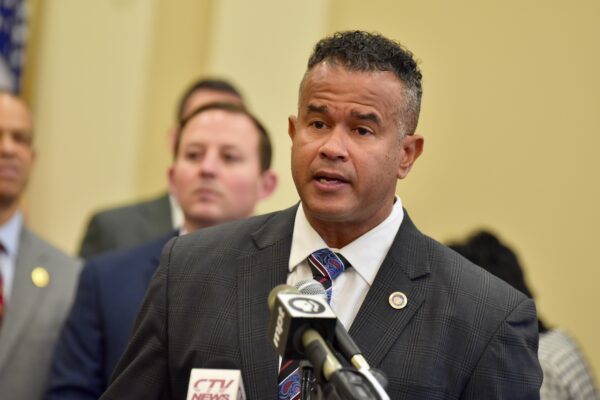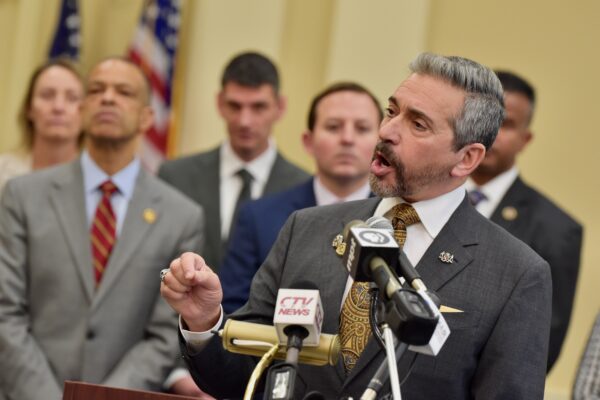Anti-scalping bill headlines ‘year of the consumer’ package

Haters are going to hate but Maryland lawmakers say they want to make it harder for scalpers to shake off anti-scalping laws and sell over-priced tickets in Maryland for the next Taylor Swift concert or other big event.
House and Senate lawmakers are proposing additional protections meant to prevent state residents from being gouged by unscrupulous ticket resellers out for a quick buck. The bill is part of four wide-ranging consumer protection bills that legislative leaders are supporting during the 2024 session.

Sen. Dawn Gile (D-Anne Arundel). Photo by Bryan P. Sears.
“While the spotlight on ticket reform arose because of the exorbitant ticket prices associated with the recent Taylor Swift tour, this issue…extends beyond major shows and globally renowned artists affecting our local venues like Maryland Hall or Merriweather Post pavilion,” said Sen. Dawn Gile (D-Anne Arundel) and lead sponsor of Senate Bill 539.
Gile’s bill and an as-yet-unfiled House version are meant to end scalping and other “predatory practices” that drive up ticket prices, Gile said.
The bill aims to limit resellers to no more than the full face value price of a ticket plus processing fees. The bill would require online resellers to itemize those fees for each step of the transaction. It would also ban the practice of speculative ticket sales where websites trick purchasers into believing an event is sold out and then selling a ticket the reseller does not own yet at a steeper price.
The new law and restrictions would apply to purchases made in Maryland regardless of where the event is located. The bill would offer protections to ticket holders who wish to transfer the tickets to friends and family, Gile said.
“Entertainment tickets are not commodities,” she said. “They’re for our fans who wish to enjoy a show. Our bill addresses the heart of the scalping issue by removing the incentive to scalp in the first place.”
The anti-scalping bill headlines a package of proposed consumer protections rolled out by Democratic lawmakers Wednesday.

House Economic Matters Chair C.T. Wilson (Charles). Photo by Bryan P. Sears.
“My committee has come out this year with a number of bills that are going to deal with consumer protection issues,” said House Economic Matters Chair C.T. Wilson (D-Charles). “We have bills for online scalping, online data privacy protection, third party energy retail protection and the Maryland Kids code.”
House Speaker Adrienne A. Jones (D-Baltimore County) said the package bolsters legislative efforts to make 2024 “the year of the consumer.”
Data privacy, protections for adults
Gile is also expected to work on legislation that could give Maryland residents more control over data collected by social media and other companies.
“Right now in Maryland, there is no comprehensive privacy law,” said Del. Sara Love (D-Montgomery). “That is a problem because companies are collecting, storing, sharing and selling our personal and sensitive data, largely without our knowledge or consent.”
Love is the lead sponsor of House Bill 567. No hearing has been scheduled for Love’s bill. The identical Senate measure, SB 541, is sponsored by Gile and scheduled for a Feb. 14 hearing in the Senate Finance Committee.
“Most people don’t realize that when you download that free app, it’s actually not free,” said Love. “We are paying for it with our data. So, we are both the consumer and the product. And that data might be our location data. It might be our reproductive health data. It might be data about a child.”
The identical House and Senate bills would minimize the amount of data that could be collected and kept secure. Consumers in Maryland would not only have to be told what is being collected but could opt out and ask that any data collected on an individual be deleted.
‘Guardrails’ for residential electricity choice consumers
Lawmakers said they also want to end deceptive practices that trick residential electricity consumers into signing on with energy suppliers who replace initial cheap electricity rates with prices that exceed rates offered by Pepco, Constellation, and other utilities.
“We just want to make sure that we are saving money, but then we’re also welcoming ingenuity,” said Sen. Malcolm Augustine (D-Prince George’s). “If folks want to save our people money, they’re welcome to it. The market is still going to be there. They just have to beat what would it cost if it were to come directly from the power company.”
Augustine said predatory practices by energy retailers have cost 300,000 electric customers in Maryland $150 million annually.
Augustine is the lead sponsor of SB 1. The identical HB 267 was filed by House Economic Matters Vice Chair Brian M. Crosby (D-St. Mary’s). Crosby is also chair of the committee’s Public Utilities subcommittee.

House Economic Matters Vice Chair Brian M. Crosby (D-St. Mary’s). Photo by Bryan P. Sears.
Crosby said “there is still going to be a competitive market and there still is going to be choice within the energy market. We are simply putting guardrails around the industry to protect Maryland ratepayers. We are protecting these Marylanders. We’re blocking deceptive practices and fruitless rate hikes without the oversight of the PSC that has been happening in our state and has been completely unacceptable. ”
We have an obligation and critical need to protect Maryland consumers. I was happy to join my colleagues in the Senate and House to announce four new bills designed to enhance and strengthen consumer protections for Marylanders in 2024. #MDGA24 pic.twitter.com/37reEpspsG
— Bill Ferguson (@SenBillFerg) January 24, 2024
Data protection for minors bill returns
Lawmakers are also proposing protections against data collection on minors.

Sen. Ben Kramer (D-Montgomery County). Photo by Bryan P. Sears.
“No parent would ever tolerate a pervert at their child’s bedroom window,” said Sen. Benjamin F. Kramer (D-Montgomery). “No parent would ever tolerate a stalker following their child to school, or sitting at the park and watching everything they do. But right now, internet companies are tracking everything that our children do, watch, read, study, post, and chat about on the internet. Electronic toys with internet connections and video games have become data harvesting devices for big tech. Smart toys can gather voice recordings, providing the manufacturers with data about the types of interactions that a child has with the toy. This information may then be shared with others and their partners in manufacturing, target the child and the parents with other internet products.”
Kramer will sponsor an as yet unfiled Senate version of HB 603, sponsored by Del. Jared Solomon (D-Montgomery).
The bill would end the ability of companies to track or geolocate minors. It also prevents the use of data collection to funnel content to children. Companies with over $25 million in annual revenue that collect or sell data for at least 50,000 users must analyze harmful impacts to minors and correct them or face a fine.
“This bill is not about content,” said Solomon. “It is about data management practices. So, we are not telling a website they need to take anything down. We are not limiting access for a young person to find that content if they want to. What we are saying is you cannot manipulate a young person based on their data, and their data points to direct them to certain types of things.”
A similar bill passed the House last year but died in the Senate Finance Committee.
That bill was opposed by NetChoice, an industry group that represents big tech firms including Amazon, Google and Facebook’s parent company, Meta. That same group has filed lawsuits in other states, most recently Ohio, challenging laws like what is proposed in Maryland.




 Creative Commons Attribution
Creative Commons Attribution